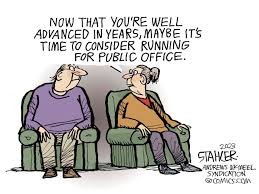TRUMP HAS FAT CHANCE IN NEW YORK COURT!
Monday, April 22nd, 2024
Baton Rouge, Louisiana
TRUMP HAS FAT CHANCE IN NEW YORK COURT!
Let’s just call it like it is. Former President Donald Trump doesn’t have a snowball’s chance in hell of been found not guilty in his current New York Court case. Now I know the case has just barely started. But you can take that to the bank, and I’ll tell you why. Whether you like Trump or not, he just has too many cards wrongly stacked against him.
First and foremost, Trump has a judge who seems to be dead set against him. Judge Juan Merchan is the prosecutor’s dream. I’m sure they were doing high-fives in the District Attorney’s Office when they heard that Merchan was going to be the judge trying Trump. Merchan has donated money to both President Biden and other Democratic causes. He has even made donations to a group dedicated to “resisting … Donald Trump’s radical right-wing legacy.” And the judge’s daughter actively works as a consultant for a number of Democratic candidates, including Rep. Adam Schiff (D-Calif.), who was the lead prosecutor in Trump’s first impeachment trial. A juror with this background would not be able to serve on Trump’s jury.
Judge Merchan should have removed himself from presiding over the Trump trial. Judges have tremendous sway on what the jury gets to hear and what it doesn’t get to hear. When the judge overseeing one’s trial has contributed money to a group that calls Trump a radical right winger, you know you’re in trouble right from the get-go.
The judge has ordered an anonymous jury and put a gag order on the former president. Look, we all agree that Trump shoots his mouth all too much. What he is facing are charges that could send him to jail and destroy his political career. Judge Markham has allowed a veil of secrecy based on the fact that everyone knows who Trump is. But all Trump knows is the names of the jurors. When the Unabomber trial took place in New York and the Oklahoma City bombing trial of Timothy McVeigh was held, both defendants were given basic information about the jurors. But not so with Trump.
Trump is allowed to step outside the courtroom, and even there he is limited as to what he can say. Here’s what often happens. The prosecution can file charge after charge, and motion at the motion, making all types of outrageous allegations that are front page news, yet the gagged defendant can do you little more than rant and rave and say nothing.
And why is the judge fearful of letting the trial be televised? In a democracy, the public has a right to see the court system in operation, close up. We have a strong tradition of public trials in this country. In earlier years, citizens would come to town and watch the defendants being tried, knew when judges issued ridiculous rulings, and saw firsthand when justice was perverted. The televising of Trump’s trial would merely be an extension of how things used to be.
Some would argue that televising the trial would create a circus atmosphere. But millions of Americans can remember back to the O.J. Simpson trial. Would anyone who watched this riveting melodrama want to keep those proceedings away from the public at large, and not have it televised? Of course not.
As Harvard professor Alan Dershowitz wrote in his book “Reasonable Doubts”:
Live television coverage may magnify the faults in the legal system, and show it, warts and all. But in a democracy the public has the right to see its institutions in operation, close up.
A judge has no business deciding the outcome of the trial against Trump or anyone else. Any judge in state or federal courts should assume the role of a referee, a mediator if you will. Not someone who by his or her rulings directly affect the outcome of any trial. But that seems to be exactly what Trump’s judge is dead set on doing.
Maybe I’m wrong about this pre-determined outcome. But with a judge like Juan Merchan overseeing the case, dark clouds are already surrounding the New York courtroom. And this bodes ill will for the former president.
Peace and Justice
Jim Brown
Jim Brown’s syndicated column appears each week in numerous newspapers throughout the nation and on websites worldwide. You can read all his past columns and see continuing updates at http://www.jimbrownusa.com. You can also listen to his weekly podcast at www.datelinelouisiana.com.









